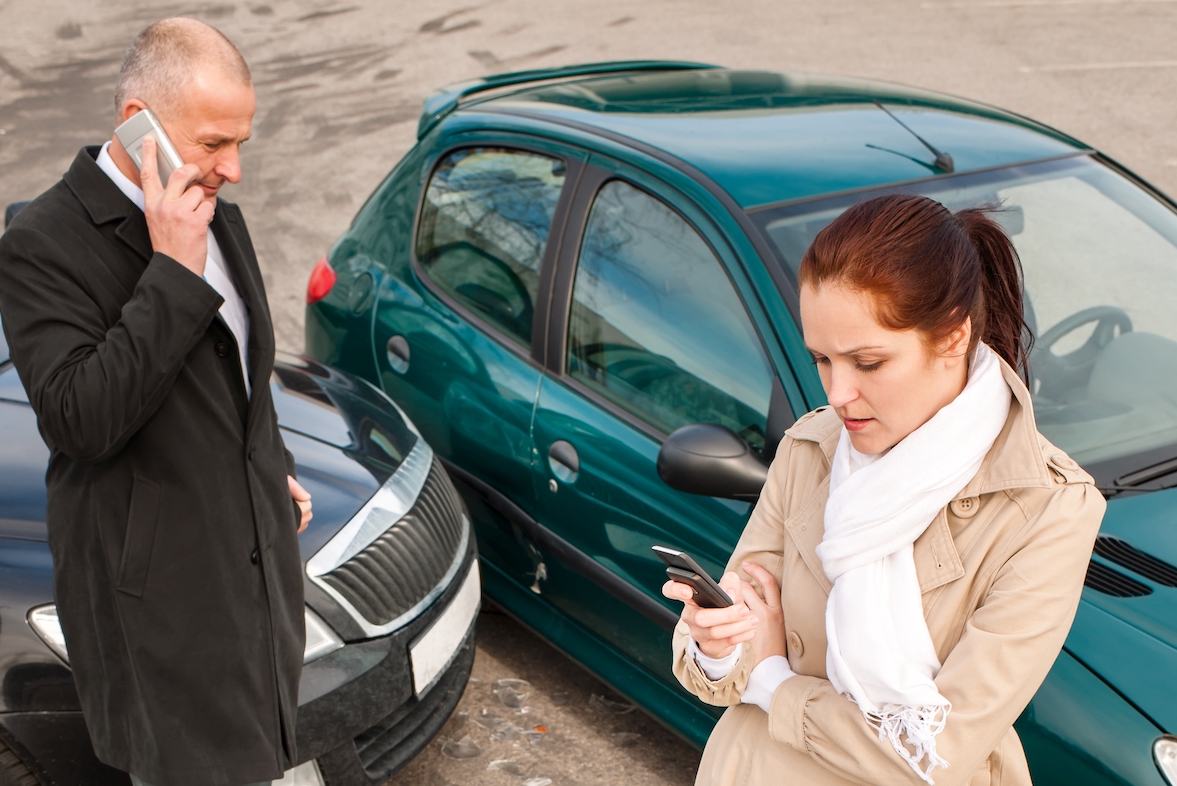
Steps to Take if You Have a Kansas City Accident Ticket
What a Nightmare!
Updated March 19, 2024 - this is all still good information. I don't have anything to add except if you get in an accident and received a ticket, CALL ME!
You sideswiped someone, didn't see someone making a turn, glanced away & CRASH, BOOM, the screeching sound of an automobile accident. That plastic & metal crushing sound can be just as crushing in your heart and especially in your wallet. I have handled thousands of traffic tickets arising from accidents and here is what I know:.
At Crash Site Checklist:
- Is everyone ok in your car? Call 911 if there are injuries.
- Is your car in a safe location or do you need to move? If there are injuries, law enforcement asks you to stay until they arrive. If you are on the highway or in a high traffic area, stay in your car or move to a safer location.
- Do the police need to be called? Should you go to the station? The general consensus is that you should call the police unless the damages are very minor.
- Are you able to safely take pictures of what happened?
- Are you safely able to exhibit insurance information? Opt to text screenshots of insurance and exchange information. Information you should collect from all parties: Name, address, driver license number, vehicle identification, license plate number, name of the insurance company, and policy number with everyone involved.
When You Get Home
You will want to contact your insurance company right away to let them know you have been in a wreck. Most insurance companies now have apps or web portals where you can report the entire thing. They will want pictures and all the information you collected from the other driver.
Tell them exactly what happened. Many people tend to over answer questions meaning if someone asks you the time, you tell them the kind of watch. Just answer the questions as best as you remember. Don't give unsolicited details. If a minor is involved in the accident, a parent or guardian should call or file the report with the child.
After you have reported to your insurance company, you should not speak directly to the other party.
- Contact your insurance company right away to let them know you have been in a wreck.
Did You Receive a Ticket?
What is the charge on the ticket?
Possible charges include Careless Driving, Reckless Driving, Prohibited Turn Resulting in an Accident, Failure to Yield Causing an Accident, Failure to Obey Traffic Signals, Excessive Speed, and Following Too Close Resulting in an Accident. All of these different charges carry different point values.
Who gave you the ticket?
Tickets are written by the Highway Patrol, Sheriff’s Department & City Police. Who wrote the ticket will make a difference in where you go to Court. Most Highway Patrol & Sheriff tickets end up in Circuit or District Court while most city police tickets end up in a Municipal Court. Tickets written by Highway Patrol & Sheriff Departments have higher point values than tickets written by city police. For instance, a speeding ticket in city court is two points and the same ticket in Circuit Court is three points. It also will make a difference to your lawyer.
Should I Pay the Ticket or Hire an Attorney?
There is always the question of whether to hire an attorney to take care of your accident ticket or to take care of it yourself. Usually, it boils down to convenience. An experienced, quality attorney is going to know the ins and outs of your jurisdiction and have worked many cases similar to yours. Thus, they will be able to take care of it in a prompt efficient manner and you will know your case is taken care of. Doing it on your own is an option too. It will save you money but you will have to do the legwork yourself. Both scenarios are described below:
Hire an Attorney
- Choosing an attorney
A referral from a friend is the best way to find an attorney. Ask your friends and family if they have received a ticket for an accident & who they hired. If you have an attorney you trust, ask them for a referral. Traffic law is a specialized area of law and many attorneys refer their clients to me because they are unfamiliar with this area of the law. There are several attorney review sites: Attorney Referral Sites,
- AVVO
- Kansas City Metropolitan Lawyer Finder
- Google Reviews - Lawyers were slow to ask for reviews as ethics laws prohibit many forms of advertising.
- It will save you a lot of time and hassle to hire an experienced attorney who has worked many cases similar to yours.
- What Should I Be Looking at For an Attorney?
A lawyer that calls you back in a timely manner. One that is familiar with the Court you received your ticket. One who can give you a timeline/guide of how the court case will proceed.
- How much should I expect to pay?
Attorney fees for accident tickets start at $500 for most attorneys in the greater Kansas City Metro area. The attorney fee can go higher for more complicated cases. Fines begin at $225 and could go higher depending on the case. Some attorneys collect fines and their fees at the start of representation. Some collect only the attorney fee and arrange for you to make payment to the Court for the fine.
- What Happens After I Contact an Attorney?
The attorney will gather all the information regarding the ticket (a copy of the ticket, a copy of the insurance good for the date of the ticket, pictures, any other information they need) and give you a quote for services. This can be done online, on the phone, via email, or through other communication. You should be given ample opportunity to ask any questions and the lawyer should be responding to them in a timely manner. Many lawyers send an invoice with the original quote. Once you have paid the invoice, you should receive an Engagement Letter from the lawyer. This can be done via mail or email. The Engagement Letter should contain the agreement you have reached with the attorney for representation including language about what has been paid. The Engagement Letter should also include the court date & court and whether you are expected to appear.
- What Happens After I have Paid the Attorney?
The attorney may have questions or updates about the case. It is important you respond to their requests in a timely manner. The attorney will begin movement on your case. This is what will happen: They will enter their appearance in the case and usually request a new court date. They will contact your insurance company and get the necessary documentation for the case.They will contact the police or prosecutor’s office to gather any evidence in the case (this usually means a police report) and then speak to the Prosecutor regarding the case. If a plea agreement is reached, get the Judge to approve the agreement. Depending on whether you are paying the fine or the lawyer has collected the fine, the fine gets paid. You receive a thank you letter from the attorney which will include the receipt from the Court.
Go it Alone - No Attorney
Check the ticket for the court date and time. Check the website or call the court to see if the court date is in person or virtually. If you are unfamiliar with the courthouse, go the night before - check your route & parking. If it is virtual, make sure you have downloaded the appropriate software - for instance, Kansas City Missouri Municipal Court uses WebEx. Whether in person or virtually, I urge you to be online or in-person at least 30 minutes prior to the court time.
- At Court
Depending on the court, you may check-in for court with a court clerk or bailiff. Many times, you will be asked to take a seat & wait for your name to be called. At some point in the proceedings, you will be asked to plead guilty or not guilty. If you plead guilty, the Judge will give you some warnings about pleading guilty without an attorney and what could happen to your driving record. They will then read the charges aloud and say something like “Today Joan Doe, you are pleading guilty to Careless Driving. The penalty for Careless Driving is up to six months in jail and/or a $500 fine. Do you still want to plead guilty”? And you answer. Then the Judge will sentence you. You are now opened up to the range of punishment they mentioned. Although accident tickets rarely result in jail time, once you have pleaded guilty, you are on the hook for whatever the Judge wants to do. So be aware. If you plead not guilty, you are asking for a trial.
The Judge will note your request for a trial and set the date for a trial. It is unlikely the trial will happen at the first court appearance because the city/state does not have its witnesses (ie: the other party & the cop). The trial itself looks like this. The Judge will swear or affirm all witnesses (you, the other party, the cop) to tell the truth. The Prosecutor will put on their witnesses first. It is likely they put on the cop first to set the scene. The cop will testify to what they saw & what was reported to them. Then the other party (the alleged victim) will testify. Then any other witnesses. After each witness the Prosecutor questions, you will get a chance to question the witness - this is called cross-examination. This is your time to poke holes in the Prosecutor’s case. Then you will have the option to put on a defense (you don’t have to put on a defense). You can opt to testify yourself or if you have witnesses. Everyone who testifies for you is subject to cross-examination by the Prosecutor including you. Everyone likes to out-smart an attorney but remember these Prosecutors do trials EVERY day. They know what they are doing.
After the testimony is finished, you will get a chance to argue your case. The Prosecutor goes first and will usually outline the ordinance/statute in their argument. They match up each element with part of the testimony. Then you get a chance to argue. You are trying to poke holes in the testimony and argument. The Judge will then rule or defer the ruling to a later date (sometimes called “under consideration”). In almost every case, if you are found guilty, the Judge will sentence you right away (usually a fine or probation or jail time if the case is very egregious). You have a right to appeal the case & you will be given that information at the time of sentencing.


